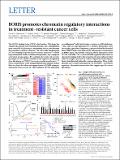BORIS promotes chromatin regulatory interactions in treatment-resistant cancer cells
Author(s)
Debruyne, David N.; Dries, Ruben; Sengupta, Satyaki; Seruggia, Davide; Gao, Yang; Sharma, Bandana; Huang, Hao; Moreau, Lisa; McLane, Michael; Day, Daniel Sindt; Marco, Eugenio; Chen, Ting; Gray, Nathanael S.; Wong, Kwok-Kin; Orkin, Stuart H.; Yuan, Guo-Cheng; Young, Richard A.; George, Rani E.; ... Show more Show less
DownloadAccepted version (7.859Mb)
Publisher Policy
Publisher Policy
Article is made available in accordance with the publisher's policy and may be subject to US copyright law. Please refer to the publisher's site for terms of use.
Terms of use
Metadata
Show full item recordAbstract
The CCCTC-binding factor (CTCF), which anchors DNA loops that organize the genome into structural domains, has a central role in gene control by facilitating or constraining interactions between genes and their regulatory elements1,2. In cancer cells, the disruption of CTCF binding at specific loci by somatic mutation3,4 or DNA hypermethylation5 results in the loss of loop anchors and consequent activation of oncogenes. By contrast, the germ-cell-specific paralogue of CTCF, BORIS (brother of the regulator of imprinted sites, also known as CTCFL)6, is overexpressed in several cancers7–9, but its contributions to the malignant phenotype remain unclear. Here we show that aberrant upregulation of BORIS promotes chromatin interactions in ALK-mutated, MYCN-amplified neuroblastoma10 cells that develop resistance to ALK inhibition. These cells are reprogrammed to a distinct phenotypic state during the acquisition of resistance, a process defined by the initial loss of MYCN expression followed by subsequent overexpression of BORIS and a concomitant switch in cellular dependence from MYCN to BORIS. The resultant BORIS-regulated alterations in chromatin looping lead to the formation of super-enhancers that drive the ectopic expression of a subset of proneural transcription factors that ultimately define the resistance phenotype. These results identify a previously unrecognized role of BORIS—to promote regulatory chromatin interactions that support specific cancer phenotypes.
Date issued
2019-08Department
Massachusetts Institute of Technology. Department of BiologyJournal
Nature
Publisher
Springer Science and Business Media LLC
Citation
Debruyne, David N. et al. "BORIS promotes chromatin regulatory interactions in treatment-resistant cancer cells." Nature 572, 7771 (August 2019): 676–680 © 2019 The Author(s)
Version: Author's final manuscript
ISSN
0028-0836
1476-4687